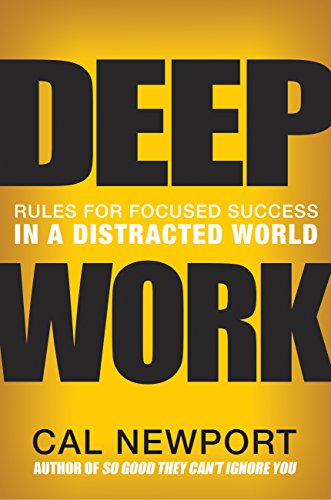Deep Work: Rules for Focused Success in a Distracted World by Cal Newport
According to Newport, deep work is a task that requires intense focus and concentration. While many of his examples are from the world of academia, his strategies are applicable for any of you serious about learning to focus in order to improve your ability to master new content and create.
There’s so much to learn in this big crazy world of ours.
Disciplining our minds to master new material is a worthy endeavor for all of us. My end results are not going to be equivalent to the Einsteins of the world. But applying our minds to a task that is difficult for us is a win-win. So don’t be put off by the title, Deep Work. This book has lessons and strategies for everyone.
Deep work may seem like an impossible task
Unless your job doesn’t require interacting with other people, during the busyness of the day , focused thoughts are brief flits of coherence that can spark away if you don’t latch onto them.
When completing my masters, I got into the practice of getting up early so I could read and write before going to work. Because by the end of the day, my brain was like a pinball. Some days I swear I could feel my brain literally jumping around in my skull as my thoughts bounced from one idea to another.
So, how do we tame our brain? What practices will enhance one’s ability to focus and engage in deep thinking? I’ve been frustrated by my untamed brain and very curious about whether I can increase my ability to focus and do sustained work.
And that’s where Deep Work Comes in
If you’ve read my about page you know that my decision to retire was to be able to spend time untangling the web of dreams gathering dust in the corners of my mind.
My overriding concern was that I would fritter my time away. Newport’s book gave me a roadmap to make the most of my time.
That said, charting the course is so much easier than staying the course.
What is required to engage in deep thinking? Well there are things I need to stop doing and there are things I need to start doing.
Newport introduces four rules for developing your ability to focus
Rule 1 – Work Deeply
“The best moments usually occur when a person’s body or mind is stretched to its limits in a voluntary effort to accomplish something difficult and worthwhile.” ~Csikszentmihalyi
Newport makes a case for developing ones ability to perform deep work and cautions against falling into the trap of equating busyness for productivity.
He doesn’t mean that there’s no place for busy work. He just doesn’t want his readers to confuse the two. We’ve all experienced busy days that have left us exhausted but also feeling like we’ve accomplished little of value.
Citing research from neuroscientists, Newport says that repeatedly sustaining focus on a task for an extended amount of time will increase the myelination of neural pathways. Increased myelination allows neurons to fire more effectively, thus increasing the ability to focus.
It’s like pruning tomatoes so nutrients aren’t sidetracked.
What’s the enemy of myelination?
Multitasking!
Now obviously it’s impossible to go through life without ever multitasking and that’s why Newport advocates for Adam Grant’s idea of batching hard but important intellectual work into longer periods of time with NO allowances for distraction.
So How do we do this?
Rituals and Routines help reduce will power depletion so a first step is to set a schedule for deep work.
Newport reviews four philosophies that range from secluding yourself for long periods of time in what he calls the Monastic philosophy to where you make use of spare moments in what he terms Journalistic Philosophy.
Then
Focus on what’s wildly important to you. Measure both what you want to improve, which is time on task, and the effectiveness of the new behaviours you’re introducing in order to increase time on task.
Keep track of your progress and review it regularly. This provides the feedback on whether your strategies are working. A weekly review allows you to make adjustments and to plan for the week ahead.
Implement a Shut Down Ritual
Giving your conscious brain rest enables your unconscious mind to sort through complex challenges.
Newport advocates for a strict shut-down ritual that is written in a series of steps that signals that you’re done, thus facilitating cognitive freedom and better performance the next day.
Rule 2 – Embrace Boredom
We live in a world of distraction and I don’t know about you but the moment my brain signals that it’s stuck or tired or bored, I grab my phone to check Twitter, or Facebook, or Instagram.
I check out the fridge, pet the cat, dehead my flowers. I’m like a crow that sees a shiny object and my brain loves the novelty of pinging from one thing to the next.
This instant gratification, Newport writes, is teaching my brain to never tolerate an absence of novelty and I’ll become chronically distracted.
Yikes!
The good news is I can teach my brain to rewire. Rather than going long periods of time without distraction, he says to create a schedule that fits your job.
It’s more important to maintain the integrity of the blocks of time then the frequency of the blocks. Newport says that if you are in the middle of deep work and need the internet to research a point or an important unrelated task pops into your mind, don’t give in to it until your prescribed time is up. Either move on to something else or wait at least 5 minutes to train your brain away from instant gratification.
Jotting a quick note so you don’t forget about it frees your mind to keep working forward.
Rule 3 – Quit Social Media – yeah it caught my attention too
Newport writes about well-known people who have given up social media, then relents a little and advocates the following as an alternative:
Apply the craftsman approach to tool selection by identifying core factors that determine success. Adopt a tool only if the positive impact outweighs the negative impact.
Decide which of the social media platforms will help you achieve your goal (whether personal or professional). Newport points out Pareto’s 80/20 rule which states that 80% or our results are produced by 20% of our actions.
List those that will help you achieve your goal.
Don’t use the internet to entertain yourself – put more thought into your leisure time. Figure out what you’re going to do with your evenings and weekends before they begin. As the saying goes, “If you fail to plan, you are planning to fail” ~ Benjamin Franklin
Rule 4 Drain the Shallows
Schedule every minute of your day by assigning blocks – minimum length of block is thirty minutes – schedule lunch and relaxation as well. Build in flexibility and have a plan B if the task doesn’t take as long as you anticipated.
Batch shallow work into task blocks – email, make appts, pay bills etc
Be liberal with our use of task blocks and make them longer than the initial tasks you’ve entered in order to have the flexibility to add others as needed.
So What am I Doing?
I’ve incorporated Newport’s task batching and block scheduling into my day. Hal Elrod’s Miracle Morning had already inspired me to implement a morning routine because my super power is drinking my coffee in solitude and thus fritter away the best part of the day.
I don’t gravitate to routines and schedules easily. They feel restrictive. However, I’m learning to harness the power that comes with living time well planned. Now that the weather is warm, I schedule hammock time.
It’s not about never having time where we can let our minds or feet wander winding paths. In fact, that’s essential to deep work.
Rather, it’s about being deliberate with our time so that downtime is truly downtime because we’ve chased our curiosity.
What’s your curiosity?
If you’re like me and struggle with making your pursuits a habit, read this book. It’s inspiring and actionable and I’ve only touched the tip of the iceberg.
“I’ll live the focused life because it’s the best kind there is.” ~ Winifred Gallagher
May you find wonder in your pursuits today!
P.S. I’d love to hear your thoughts on scheduling time for deep work. And don’t forget to sign up for the weekly newsletter which has some extra musings for you to consider.
Thanks for reading!

Yes! I want to receive your newsletter!
Simply . . .


Interesting suggested read, the challenge of keeping focused and on task is something we all have problems mastering. I think I need to read this book
It’s well worth the time.